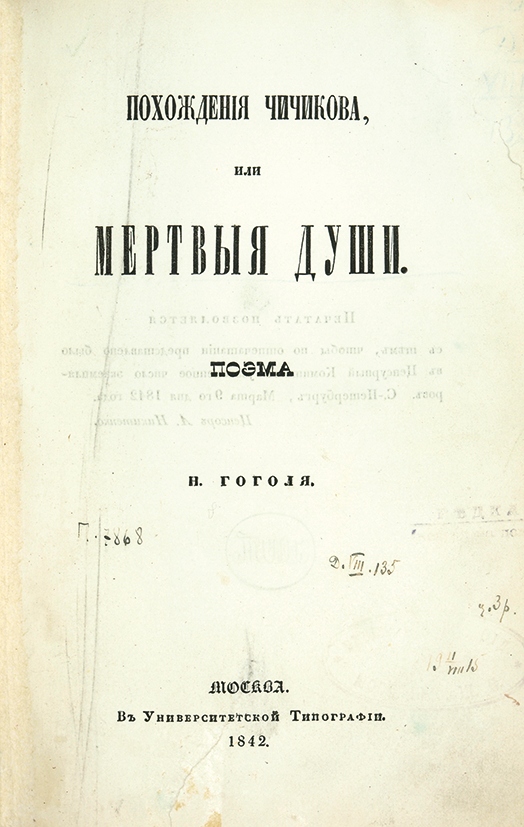Dead Souls

Cover page of the first edition of Dead Souls. Moscow, 1842
|
|
| Author | Nikolai Gogol |
|---|---|
| Original title | Мёртвые души |
| Country | Russian Empire |
| Language | Russian |
| Genre | Political, Satire |
| Media type | Hardback and paperback |
| Followed by | Dead Souls 2 (destroyed by the author before his death) |
| Text | at |
Dead Souls (Russian: Мёртвые ду́ши, Myórtvyjye dúshi) is a novel by Nikolai Gogol, first published in 1842, and widely regarded as an exemplar of 19th-century Russian literature. The purpose of the novel was to demonstrate the flaws and faults of the Russian mentality and character. Gogol portrayed those defects through Pavel Ivanovich Chichikov (the main character) and the people whom he encounters in his endeavours. These people are typical of the Russian middle-class of the time. Gogol himself saw it as an "epic poem in prose", and within the book as a "novel in verse". Despite supposedly completing the trilogy's second part, Gogol destroyed it shortly before his death. Although the novel ends in mid-sentence (like Sterne's Sentimental Journey), it is usually regarded as complete in the extant form.
The original title, as shown on the illustration (cover page), was "The Wanderings of Chichikov, or Dead Souls. Poema", which contracted to merely "Dead Souls". In the Russian Empire, before the emancipation of the serfs in 1861, landowners had the right to own serfs to farm their land. Serfs were for most purposes considered the property of the landowner, who could buy, sell or mortgage them, as any other chattel. To count serfs (and people in general), the measure word "soul" was used: e.g., "six souls of serfs". The plot of the novel relies on "dead souls" (i.e., "dead serfs") which are still accounted for in property registers. On another level, the title refers to the "dead souls" of Gogol's characters, all of which represent different aspects of poshlost (a Russian noun rendered as "commonplace, vulgarity", moral and spiritual, with overtones of middle-class pretentiousness, fake significance and philistinism).
...
Wikipedia
